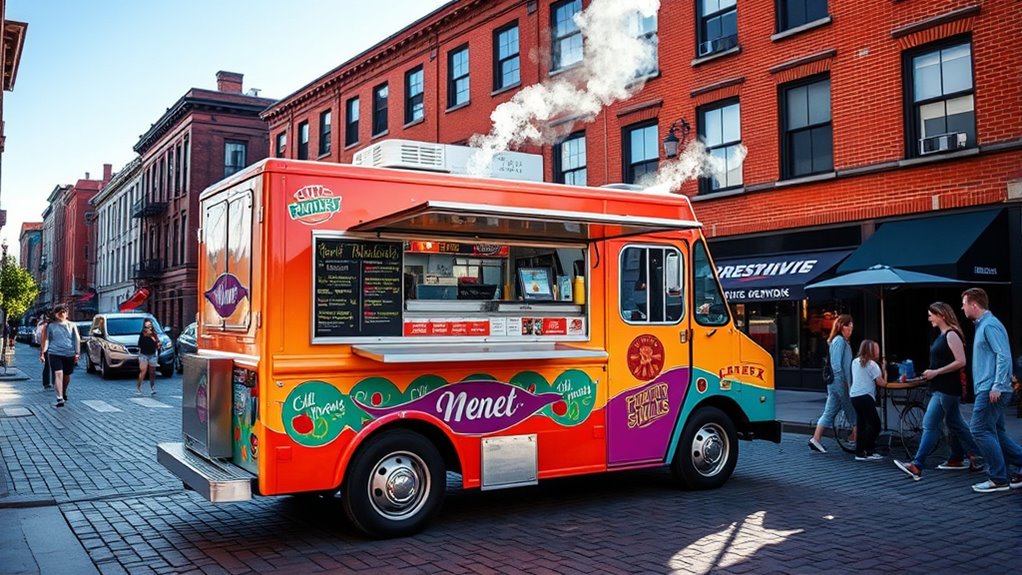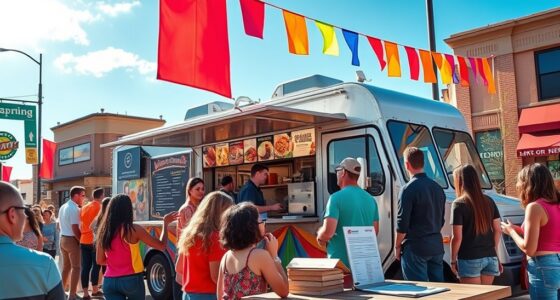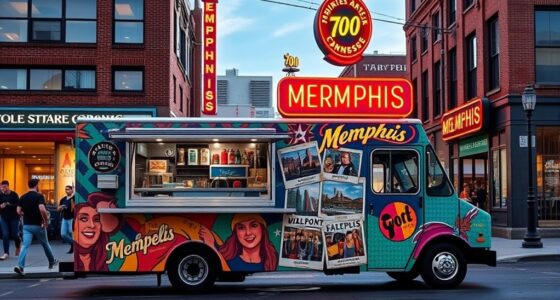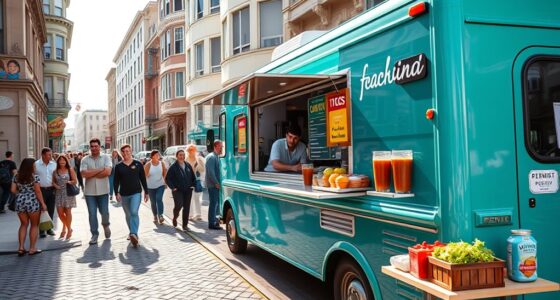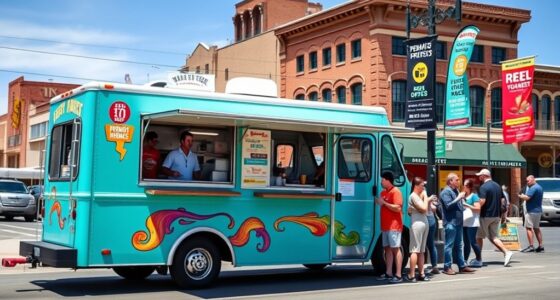To start a food truck in Providence, Rhode Island, you’ll need to secure permits like a mobile food vendor permit, health inspection, and fire safety clearance, costing around $200 total. Budget for startup costs between $35,000 and $200,000, including truck purchase and equipment. Choose compliant locations—avoid neighborhoods with restrictions—and develop a safe menu following state food safety rules. Effective marketing through social media and local events will help attract customers. Learn more about maintaining your truck’s success below.
Key Takeaways
- Obtain necessary permits including Providence mobile food permit, health inspection, fire safety, vehicle registration, and insurance.
- Startup costs range from $35,000 to $200,000, covering truck purchase, equipment, permits, and licenses.
- Comply with zoning laws and secure permissions for parking and event participation; avoid neighborhood restrictions.
- Develop a compliant menu emphasizing safety, ingredient sourcing, allergen disclosure, and proper food handling procedures.
- Use social media, local events, and geo-targeted advertising to boost visibility and attract customers.
Navigating Permits and Licensing Requirements in Providence
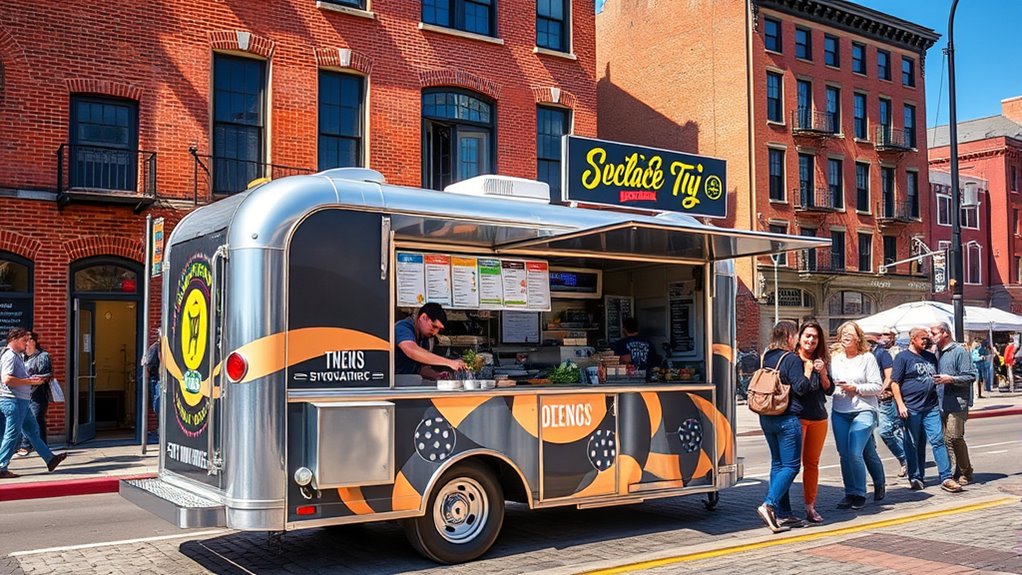
To legally operate a food truck in Providence, you need to navigate a series of permits and licensing requirements that guarantee compliance with both state and local regulations. First, you must register your mobile food establishment (MFE) with the Rhode Island Department of Business Regulation (DBR), which allows you to apply for municipal permits. You’ll also need a Mobile Food Service License from the Department of Health, obtained after submitting an application and passing a health inspection. The Providence Municipal Mobile Food Establishment Permit is issued once you provide proof of state registration, fire safety certificates, vehicle registration, insurance, and sales tax permits. Fire safety inspections are mandatory for trucks using flammable equipment. Keep all permits current to operate legally within Providence. Registering with the Rhode Island Commerce Corporation is essential for obtaining your municipal permit, ensuring you meet all necessary requirements before beginning operations. Additionally, understanding the regulatory compliance requirements helps prevent potential legal issues and fines.
Understanding Costs and Fees for Your Food Truck Venture
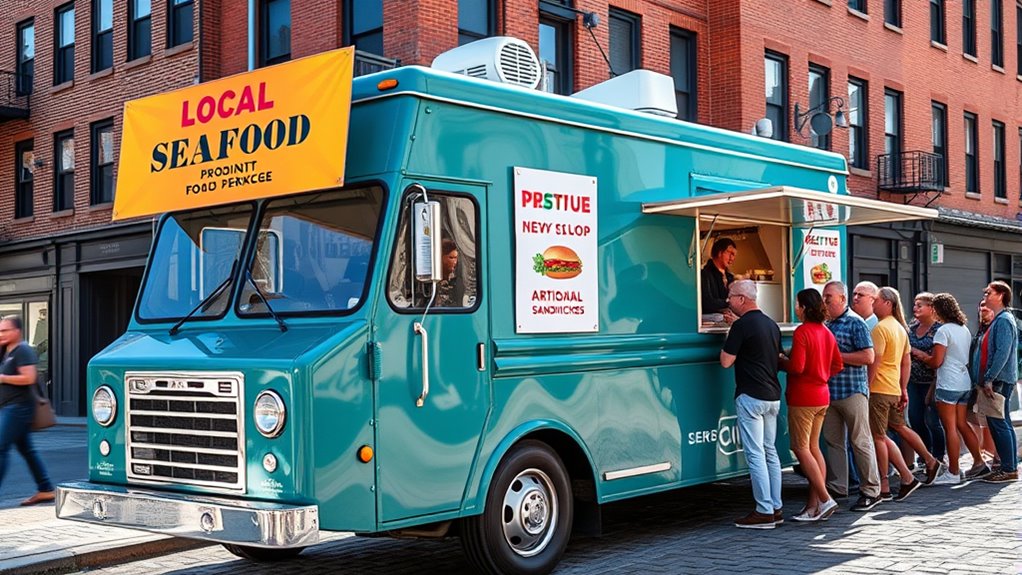
Understanding the costs and fees involved is essential before launching your food truck in Providence. You’ll need to budget for permit application fees, safety inspection expenses, and ongoing operational costs. Being aware of these financial factors helps you plan effectively and avoid surprises along the way. Obtaining an EIN via IRS online application is also a necessary step to establish your business identity and open bank accounts. Additionally, understanding the importance of creative practice can help you develop innovative menu concepts and marketing strategies that stand out in a competitive market.
Permit Application Fees
Managing permit application fees is a crucial step in launching your food truck in Providence, as these costs can greatly influence your startup budget. The city charges a $75 fee for each municipal permit application, payable online (with a small convenience fee), by check, or money order. Checks must include your application number for processing. This fee covers permit issuance through the Providence Board of Licenses. Keep in mind, renewal and ongoing compliance fees may apply later. Additional costs could arise depending on neighborhood parking permissions or special event permits. Besides the municipal fee, you’ll need to budget for state-level registration, licensing fees, and possible costs for vehicle registration, insurance, and background checks. Planning for these expenses ensures you’re financially prepared to navigate Providence’s permitting process smoothly. Incorporating professional advice or consulting with local licensing experts can help clarify specific requirements and avoid unexpected expenses.
Safety Inspection Expenses
Moving through safety inspection expenses is a key part of launching your food truck in Providence. The fire safety inspection typically costs around $100, with reinspection fees also near $100 if needed. You’ll need UL 1484-rated propane alarms, tested monthly, and LP gas lines and fittings must be checked before each use, with logs kept for compliance. Fire extinguishers—Class K for grease fires and ABC multipurpose types—must pass inspection and be maintained regularly. The health department charges a one-time $100 plan review fee, and inspections for sanitation standards are mandatory. Additional costs include scheduling inspections, municipal permit fees (~$75), and potential reinspection charges. Proper safety equipment upkeep and documentation are essential to avoid penalties and ensure your truck remains compliant. Regular maintenance checks are vital to ensure ongoing safety compliance and prevent costly violations. Additionally, understanding the safety inspection process can help you prepare effectively and avoid unexpected expenses.
Operational Cost Considerations
Starting a food truck in Providence requires a clear grasp of the various costs involved, from initial investments to ongoing expenses. You’ll need to budget $35,000–$100,000 for a used truck or $100,000–$200,000 for a new one. Cooking equipment, like grills, fryers, and ovens, can range from a few hundred to several thousand dollars each. Refrigeration and sinks add to startup costs, with expenses up to $7,000 and $1,500 respectively. Don’t forget licensing, permits, and commissary fees, which can total over $1,000 monthly. Ongoing costs include fuel, payroll, insurance, and marketing. Food prices fluctuate, impacting menu pricing, while technology systems like POS and inventory software add monthly fees. Managing these costs is essential for a successful venture. Additionally, understanding local Rhode Island food regulations and compliance requirements can help prevent costly delays or fines during setup. Proper budgeting for the operational costs can ensure your food truck remains financially sustainable as you grow.
Finding the Right Locations and Zoning Compliance
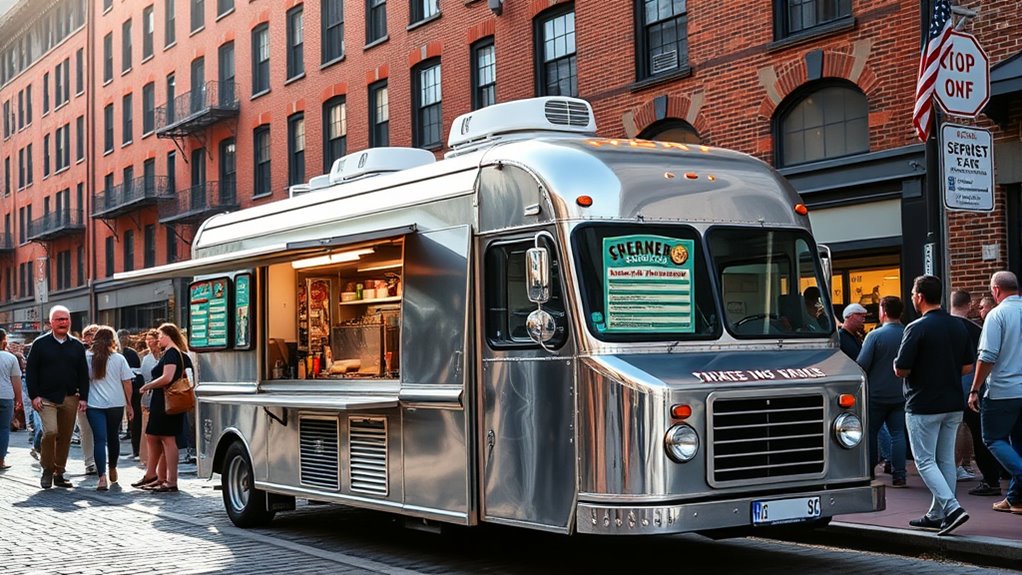
Are you aware of the specific zoning rules and location restrictions that impact where you can operate your food truck in Providence? You need to follow Providence’s land use regulations and zoning ordinances, which can restrict parking and operations in neighborhoods like Federal Hill, College Hill, and Wayland Square. No food service is allowed on the driving-lane side, nor can food be prepared or sold outside the truck. Browser compatibility issues may arise if you try to access the city’s zoning maps online using outdated browsers, so ensure your browser is up-to-date for accurate information. Additionally, understanding zoning compliance is crucial to prevent potential violations that could disrupt your business.
Developing a Safe and Compliant Menu
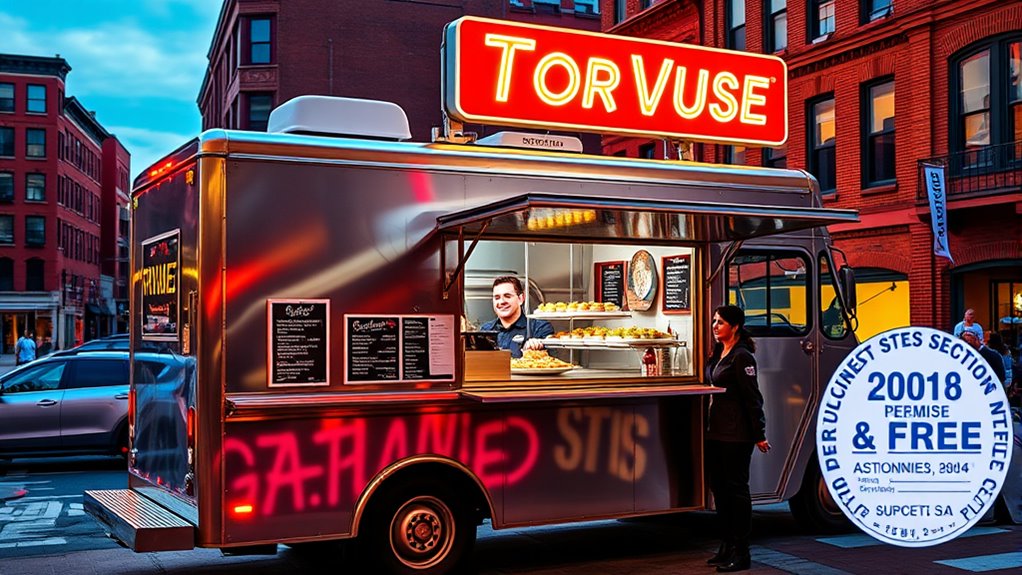
To develop a safe and compliant menu, you need to follow Rhode Island’s food safety regulations and handling standards carefully. Make sure your equipment meets safety codes and that ingredient sourcing is trustworthy and traceable. By focusing on these points, you’ll create a menu that’s both delicious and aligned with health and safety requirements. Additionally, the proposed ordinance changes aim to regulate food truck operations more strictly, emphasizing the importance of following local health standards to avoid conflicts and enforcement issues. Ensuring compliance with food safety regulations is essential for maintaining a good reputation and avoiding legal complications.
Food Safety Regulations
Developing a safe and compliant menu for your food truck requires understanding and adhering to Rhode Island’s food safety regulations. You must have at least one full-time, on-site Food Safety Manager with ServSafe certification during food prep and hot-holding. If serving vulnerable populations, a certified manager must be present whenever hot food is prepared. For businesses with ten or more full-time workers, two certified managers are needed. Your truck must meet Rhode Island Food Code standards, including refrigeration below 41°F and a three-compartment sink system for cleaning. Proper handwashing stations and fire safety equipment, like UL-rated propane alarms, are mandatory. You’ll need to pass an inspection by the Department of Health and maintain temperature logs and sanitation records to make certain of ongoing compliance and safe menu development. Additionally, understanding the food safety regulations helps ensure your menu remains compliant and minimizes the risk of violations.
Ingredient Handling Standards
Ensuring ingredient safety starts with sourcing and handling practices that meet Rhode Island’s food regulations. You must buy ingredients from approved, reputable suppliers and discard any contaminated or adulterated items. Allergen disclosures are mandatory; major allergens must be clearly declared to protect customers. Handle raw ingredients requiring temperature control under proper conditions to prevent spoilage and pathogens. Proper labeling is essential, including business info and allergen warnings, with routine updates for recipe or supplier changes. Store perishables at safe temperatures, sanitize contact surfaces, and follow FIFO for inventory. Separate raw and ready-to-eat ingredients to prevent cross-contamination. Design recipes using safe, minimally risky ingredients, and apply HACCP principles to identify hazards. Food safety training is a crucial component in maintaining high standards and legal compliance in your operation. Additionally, establishing a comprehensive sanitation protocol helps to consistently maintain cleanliness and reduce contamination risks. Train your staff on safe handling and allergen management to maintain compliance and ensure customer safety.
Equipment Compatibility Checks
Choosing menu items that align with your food truck’s equipment capabilities is essential for maintaining safety and compliance. You need to ensure refrigeration units keep perishable foods at or below 41°F to prevent bacteria growth. Your cooking appliances must meet fire safety standards and be compatible with onboard suppression systems. Proper ventilation and electrical wiring, which meet local codes, are crucial for safety. All equipment, from sinks to cooking devices, must be approved and inspected regularly by Rhode Island health authorities. Remember, menu items requiring precise temperature control, like meats and dairy, are only permitted if your refrigeration and cooking gear meet strict standards. Limiting menu options might be necessary if your equipment can’t safely support certain foods, ensuring compliance and protecting your customers. Additionally, regular equipment maintenance and calibration are vital to prevent equipment failure that could compromise food safety. Ensuring your equipment’s performance and reliability can help avoid unexpected issues that might lead to violations or health risks.
Effective Marketing Strategies to Attract Customers
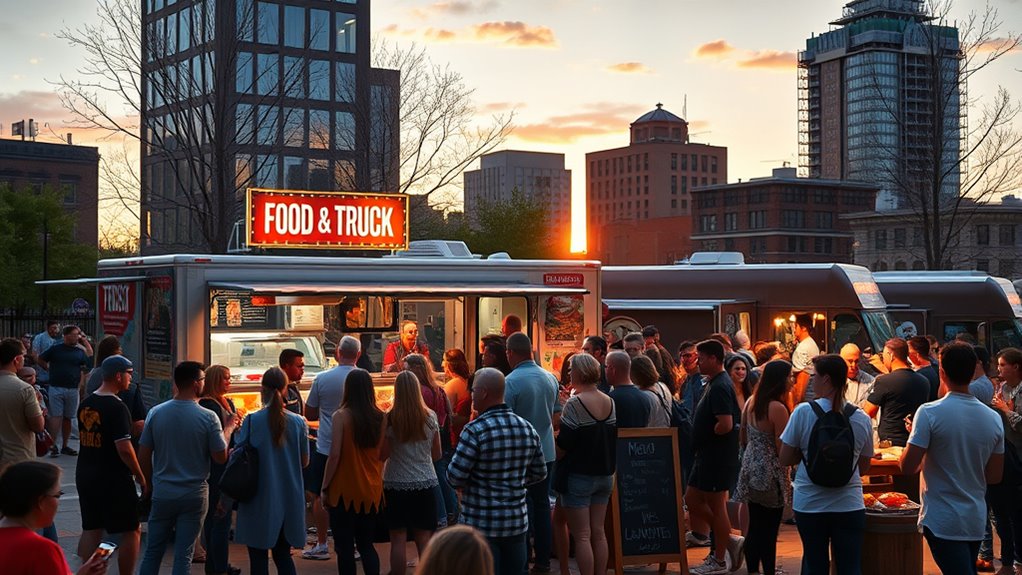
To effectively attract customers, food truck owners must leverage a mix of modern marketing strategies that maximize visibility and engagement. Social media is essential; 75% of trucks actively use Facebook, resulting in a 20% sales boost. Mobile apps for locating trucks saw a 35% increase in downloads last year, making it easier for customers to find you. Participating in local events and festivals, with 80% of trucks joining at least three annually, increases brand awareness and foot traffic. Loyalty programs, adopted by over half of food trucks, can raise repeat business by 30%. Using data analytics, you can refine your marketing efforts and target specific customer segments, boosting ROI by 25%. GPS tracking and geo-targeted ads further enhance reach, encouraging impulse visits and expanding your customer base. Market growth and industry expansion continue to create new opportunities for innovative marketing approaches, ensuring your food truck stays competitive and visible in a crowded marketplace.
Staying Up-To-Date With Operational and Regulatory Standards

Staying current with operational and regulatory standards is vital for keeping your food truck legally compliant and running smoothly. You must regularly renew permits from Providence, ensuring all are up-to-date and compliant with city regulations. Fire safety is mandatory; this includes periodic inspections and adhering to fire code mandates like installing and testing propane or LPG alarms rated UL 1484. Keep track of local ordinance updates affecting permitted locations, hours, and noise restrictions. Ensure your vehicle registration and insurance are valid, including out-of-state vehicles if applicable. Monitoring Rhode Island Department of Health regulations is essential for food safety, sanitation, and staff training. Maintain detailed records of inspections, permits, and maintenance to streamline compliance and avoid penalties. Staying informed prevents legal issues and ensures ongoing operational success. Regularly updating your knowledge of local food safety and business laws is also crucial to adapt to any changes that could affect your operation.
Frequently Asked Questions
How Long Does the Permit Approval Process Typically Take in Providence?
You probably wonder how long the permit approval takes. Usually, it takes around 30 days or more from submitting your application to getting approved. The process includes document review, scheduling an inspection, and passing health requirements. To speed things up, make sure your application is complete, all certifications are in place, and you schedule your inspection early. Delays can happen if paperwork is incomplete or inspections are delayed.
Are There Restrictions on Operating Hours for Food Trucks in Providence?
You need to know that Providence restricts food truck hours between 2 AM and 6 AM citywide. Additionally, if you’re near restaurants, institutional dining, or entertainment venues within specified buffers—200 or 300 feet—you must follow more specific time restrictions. Always verify local ordinances and buffer zones to guarantee compliance, because operating outside these hours can lead to fines or permit issues. Planning your schedule accordingly helps you stay legal and avoid penalties.
Can I Sell Beverages or Alcohol From My Providence Food Truck?
Think of your food truck as a ship sailing in a legal ocean. You can serve non-alcoholic beverages like water, soda, or coffee, steering smoothly with proper permits and health compliance. However, the law acts as an unseen reef—strictly prohibiting alcohol sales from your vessel. Attempting to sell or promote alcohol can cause your ship to run aground with fines or license revocations. Stick to safe waters, and you’ll stay compliant.
What Are the Specific Health Inspection Criteria for Mobile Food Vendors?
You need to meet specific health inspection criteria to operate your food truck safely. This includes passing regular inspections by RIDOH to ensure compliance with public health codes, maintaining proper food handling procedures, and displaying food safety manager certifications visibly. Your truck must have functioning equipment, proper sanitation, and safe food storage. If any violations occur, you’ll need to rectify them promptly to avoid fines or license suspension, ensuring safe service for your customers.
How Often Do Propane and Electrical Safety Systems Need to Be Tested?
You need to test your propane safety systems monthly to stay compliant with Rhode Island Fire Code. Before each use or when changing cylinders, test LP gas connections and verify proper inspection documentation. Electrical systems should be inspected during initial fire inspections and permit renewals, with regular checks aligning with overall safety protocols. Keeping thorough records of all tests is essential to maintain your food truck’s safety and permit status.
Conclusion
So, you’re all set to conquer Providence’s food scene—just remember, maneuvering permits and zoning is easier than convincing customers your kale smoothie is a meal. Keep your menu safe, your costs in check, and your marketing clever enough to stand out. Stay updated, stay compliant, and maybe, just maybe, you’ll be the food truck legend Providence never knew it needed—until you start serving those irresistible tacos, of course. Good luck, future culinary superstar!
